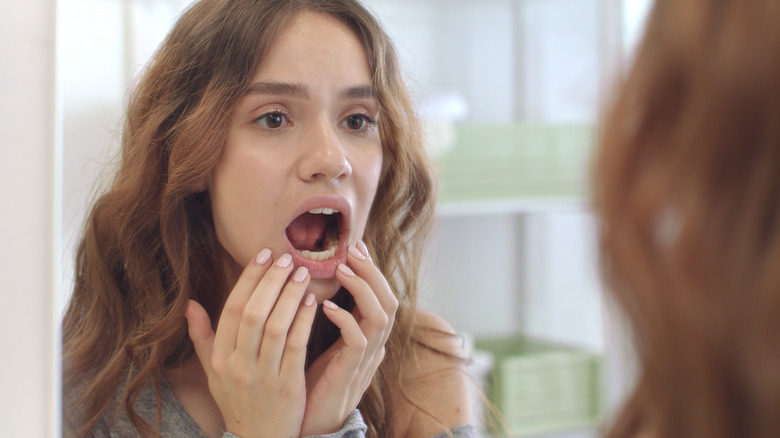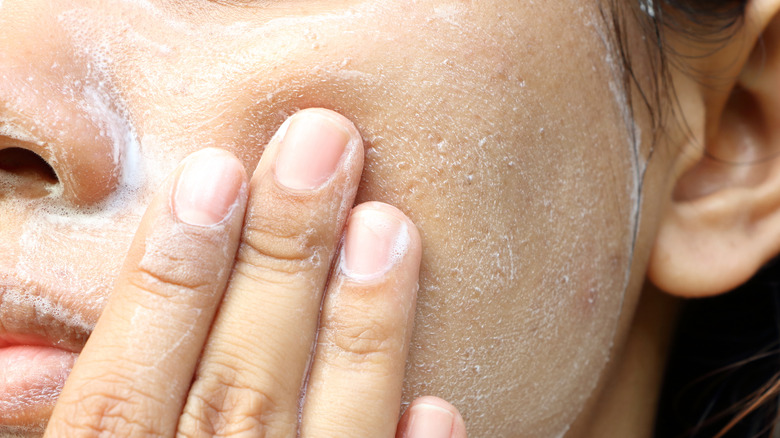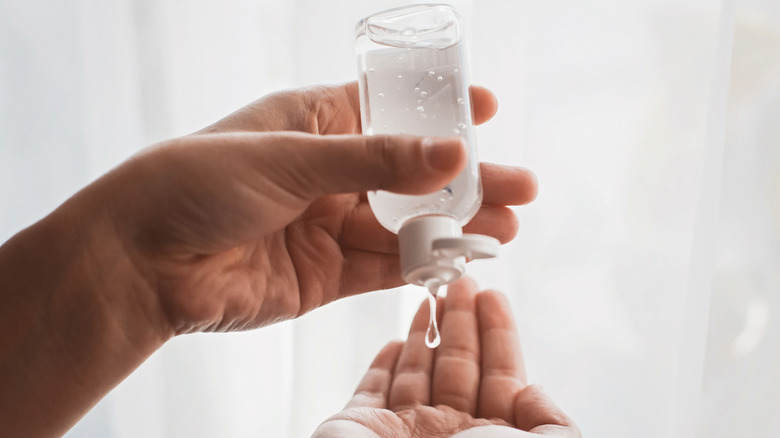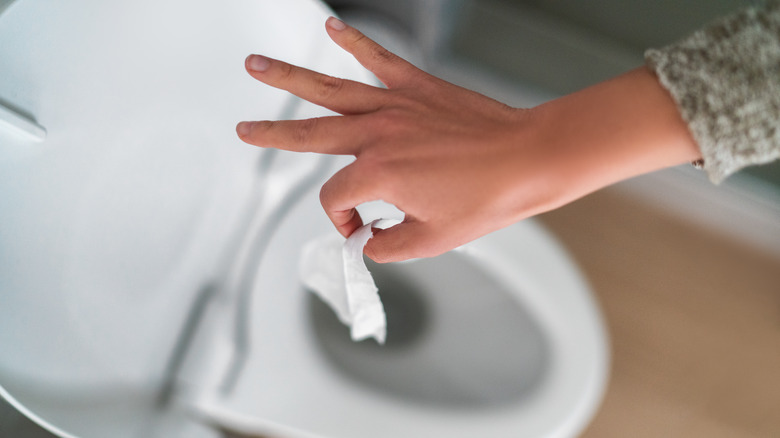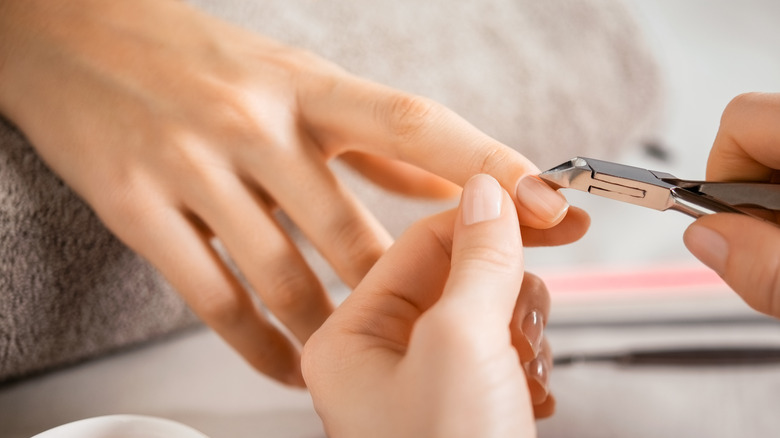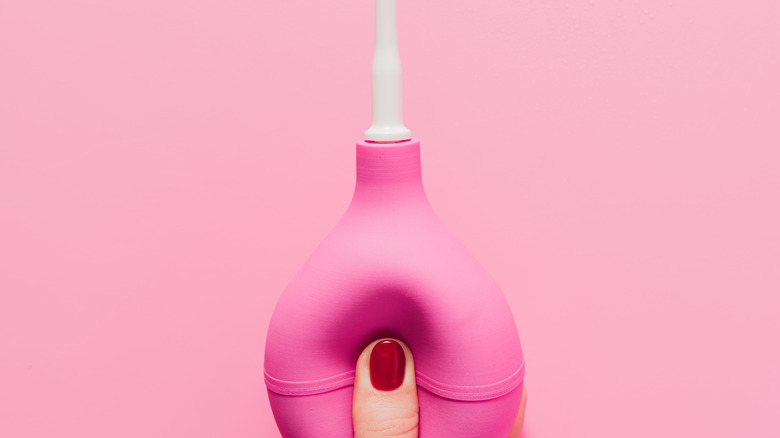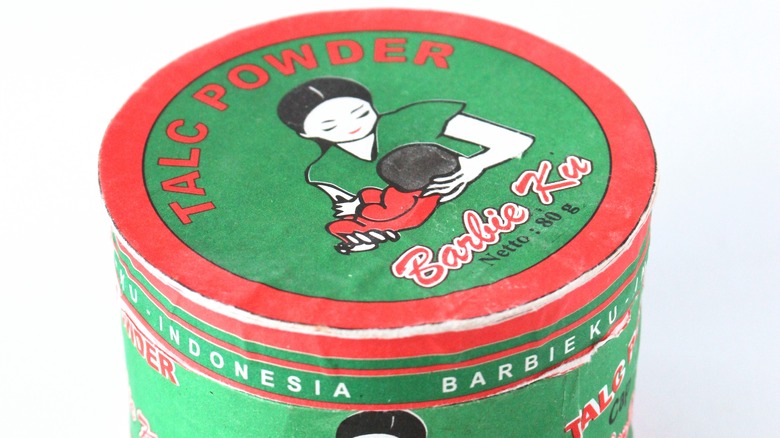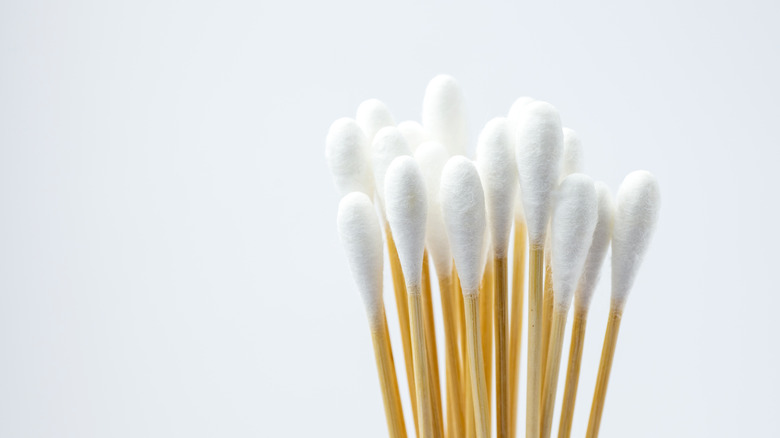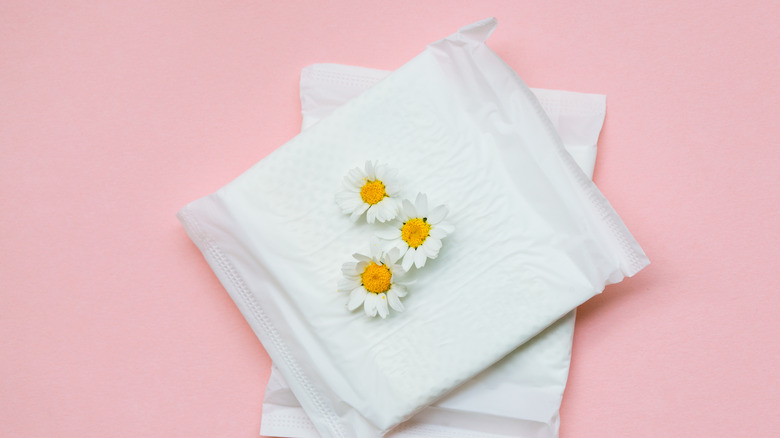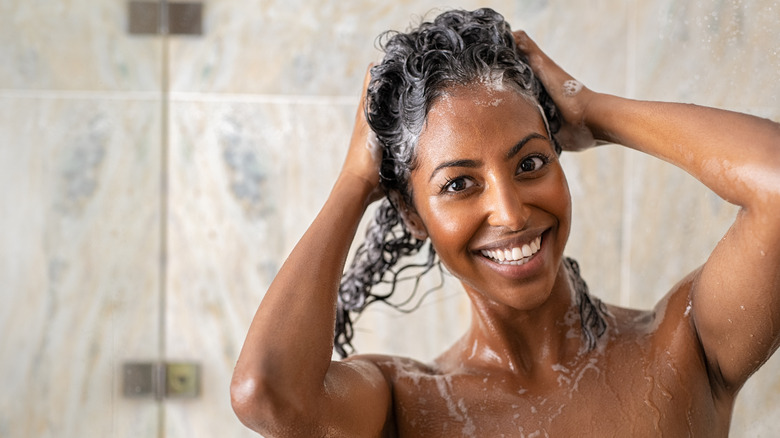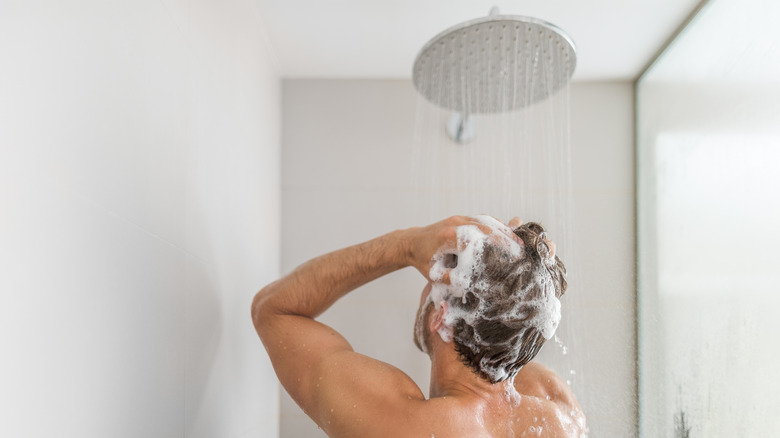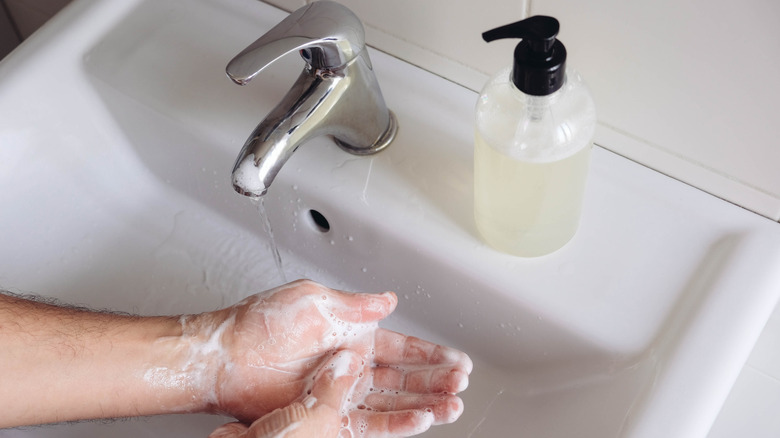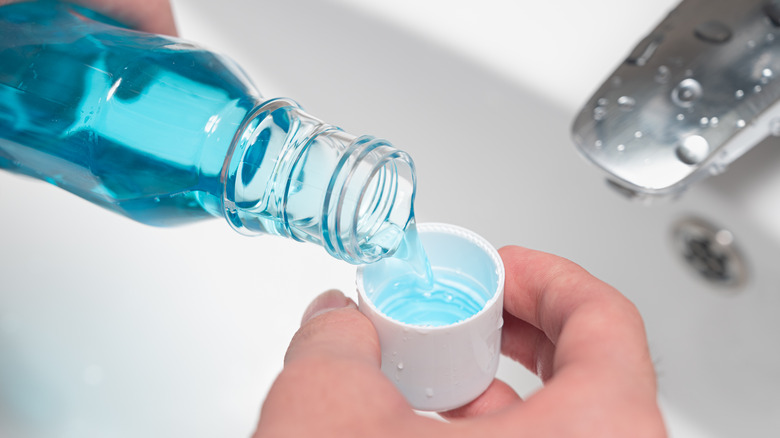Common Hygiene Habits That Aren't As Healthy As You Think
While practicing good hygiene is something that's often taught to us at an early age and we probably don't think twice about anymore, some of those practices we learned so long ago can be, well, a bit outdated. Furthermore, what constitutes "good" hygiene to one person can actually be surprisingly unhygienic to another. To provide an all-encompassing definition of personal hygiene, experts at Medical News Today explain that personal hygiene is essentially making sure the external parts of the body are both "clean and healthy," and that staying on top of these habits helps to support both physical and mental health. If personal hygiene habits are not maintained, an accumulation of germs on the body could make it prone to infection. Brushing your teeth, washing your hands, keeping your nails clean, and bathing regularly are all examples of ways to practice good personal hygiene. However, with all of these habits, there are certain "upgrades" that can be applied based on new research to make them even healthier. While some of your habits might just need a light tweak, others are downright dangerous and should probably be eliminated from your routine altogether. Continue reading to discover common hygiene practices that may not be as good for you as you think.
Over-exfoliating your face
If you've dealt with "problematic" skin that is dull, clogged, or acne-prone, one of the first suggestions you're likely to hear? "Exfoliate, exfoliate, exfoliate." While exfoliating can be a great way to clear away dead skin cells to expose your shining epidermis underneath, it is possible for there to be too much of a good thing. According to Healthline, exfoliation has risen in popularity recently, with an abundance of scrubs, toners, serums, and brushes on the market targeted toward those who want fresh-looking skin. Signs of over-exfoliated skin include irritation, redness, and inflammation, which could eventually lead to dry and irritated skin. Another perplexing side effect is a false "glow," which experts at the site say is actually the exposed underlayer of the skin, which will eventually dry and crack. While wanting to get all the gunk out of your pores is certainly a righteous cause, dermatologist Dr. Aanand Geria spoke to Healthline and explained how to not overdo it: "Over-exfoliating is one of the biggest mistakes we see people making. Generally, skin should be exfoliated only one to two times per week to help expedite skin cell turnover without causing damage," he said.
Brushing your teeth after breakfast
While it might seem logical to wait to brush your teeth until after you've washed down your breakfast with a delicious cup of coffee, dentists across the nation are clutching their pearls at this hygiene mistake. According to experts at Healthline, while you sleep, the bacteria in your mouth multiply, leading to dreaded "morning breath" and an overall unpalatable taste. When you brush your teeth right away instead of waiting until after breakfast, the teeth are cleansed and a protective barrier is placed over the enamel which can protect it from acidic breakfast foods such as orange juice, coffee, and even toast. Experts at the site also explain that brushing your teeth actually "jumpstarts" the production of saliva, which can help break down food and kill bacteria in your mouth. Furthermore, taking a toothbrush to your teeth after your morning meal can spread around the acidic remnants of the aforementioned breakfast foods, which can lead to a breakdown of your enamel. If you must brush your teeth after breakfast, experts at Healthline suggest waiting 30 minutes to an hour after you've eaten, particularly if you've had acidic foods such as coffee and citrus juice.
Overusing hand sanitizer
After the arrival of the global pandemic, hand sanitizer became somewhat of a mainstay in most people's lives. In our purses, in the entry of every storefront, at the checkout line — it's pretty difficult to avoid. While the intention of using hand sanitizer to stop the spread of potentially deadly germs is incredibly important during these times, it's possible to overdo it. According to experts at Healthline, using too much hand sanitizer can lead to dry, cracked skin and other uncomfortable and unsightly side effects. The site goes on to explain that depending on the makeup of your hand sanitizer, some of these effects may be heightened or lessened. Most hand sanitizers are made of at least 60% to 90% alcohol; however, even the ones on the lower end of the alcoholic spectrum may contain potential irritants. Experts at the site explain that despite all the good it can do to kill germs, alcohol also dries out the skin considerably. Using it too often can lead to dry, flakey skin (which actually makes your skin more vulnerable to germs), and it can even trigger eczema flare-ups for those who have the condition. Furthermore, a common ingredient in hand sanitizer, triclosan, has been linked to disruption in hormones and has even contributed to antibiotic resistance, according to the site.
Using baby wipes
While reaching for those baby wipes after sitting on the porcelain throne may seem like the habit of a civilized human being, you might actually want to reconsider this one. While it's understandable to want to feel sparkling clean with no trace left ... behind ... experts caution against this seemingly healthy habit. Evan Goldstein, anal surgeon and founder of Future Method, spoke to Well + Good to explain exactly why this isn't the best idea. Like the rest of our body, our anal region is covered in both good and bad bacteria — and as Goldstein says, "This is important, so when you start to augment that [microbiome] with wet wipes, what happens is that you're wiping away the good bacteria and the balance becomes a problem. With the homeostasis in the biome altered, bad bacteria starts to populate fungus or irritation, which I see all of the time." Goldstein goes on to explain that because most people tend to use wipes, pull up their pants, and run, the moisture left over from the wipes just sits on the rear, which can lead to further irritation and discomfort.
Trimming your cuticles
If you missed a trip to the nail salon and are tempted to give yourself an at-home manicure, go for it — just be sure to set the cuticle trimmers aside. You might have memories (or nightmares) of the times you've gone to the salon, wincing as the esthetician goes to town on your cuticles, trimming away until your nail bed is completely bald. Well, according to dermatologists, none of that is technically necessary. Richard Scher, a Cornell University dermatology professor, spoke to WebMD and explained exactly why that is. He says that cuticles are "there for a reason, like a barrier or a protection for the nail matrix ... If you remove the cuticle, that space is wide open, and anything can get in there." Experts at WebMD explain that cuticles are a part of your skin, and that they overlay the part of the nail bed where your nails grow. If you cut them it could lead to white spots, ridges, and at worst, a bacterial infection. If you are looking for the "clean" look of trimmed cuticles, experts at WebMD suggest using an orange stick to gently push back the cuticles to help the nail bed look longer.
Douching
Douching has long been on the black list of outdated habits that most people would hesitate to admit they do. However, researchers estimate that a surprising 20% to 40% of women are still using douches regularly, which means there needs to be continuing education on the myths and risks surrounding this use of this product, according to Everyday Health. Experts at the site explain that douching is the act of washing or rinsing the vagina with water or another product. The douche itself is a bottle-like apparatus which allows users to squeeze the liquid into the vagina to "cleanse" it, and ingredients such as vinegar, baking soda, and perfume have been known to be included in these mixtures.
However, there is a consensus among experts that douching provides no real benefit, and can actually cause harm in the region. This is because the vagina is self-cleaning and has a delicate pH balance that can be easily thrown off by douching. According to Beverly Whipple, professor emerita at Rutgers University and secretary general of the World Association for Sexual Health: "Douching flushes out the normal bacteria in the vagina that are there to fight vaginal infections. It was used for medical treatment until the mid-20th Century, when it was found that it was not healthy," she told Everyday Health.
Using talc powder
During the hot summer months when sweat abounds, reaching for baby powder can be a very easy form of relief. While many baby powders on the market today are safe to use, others that include talc in the mixture have been shown to cause long-term damage. According to experts at WebMD, talc is a mineral found in the earth that is exceptionally good at absorbing moisture. For this reason it's been included in many products including blush, other makeup products, and perhaps what it is most known for, baby powder.
According to WebMD, talc has been known for some time to be linked to cancer, but the connection between the two hasn't always been so clear. Experts explain that much of the concern is actually connected to talc that is mixed with asbestos, a mineral that has been shown to cause cancer. Many of the sites where talc is mined also contain asbestos, hence the concern about the two ingredients mixing. While regular testing is required to eliminate any concerns about cross contamination, according to Healthline, a 2019 report from the FDA showed that 9 out of 52 tested cosmetic talc samples were found to contain asbestos. If you are concerned about the potential for cancer, Healthline says that the American Cancer Society suggests limiting your exposure to it, and substituting it with products that contain pure corn starch.
Using cotton swabs in your ears
It's understandable — cotton swabs really are the perfect size to stick into your ear canal to clear out wax. However, according to Healthline, while they are safe to use to clean out the outer ear, using them in the inner ear could lead to a whole host of problems. Contrary to popular belief, that earwax you are so eager to get rid of is actually healthy and serves a good purpose. Experts at the site explain that earwax helps keep your ears from drying out, and can trap dirt and bacteria, helping to prevent infection. One of the side effects of using a cotton swab to clean out wax from the ear canal is that you can actually push it further in, leading to a compaction of wax. This prevents the wax from clearing away naturally, leading to a buildup which can cause pain and muffled hearing. Furthermore, it's possible to injure yourself by inserting the swab too far in, which can lead to a ruptured eardrum. Ears are self-cleaning, and it is typically unnecessary to clean them out yourself, according to Healthline. However, when earwax does make its way from the canal to the outer ear, it is safe to gently wipe away excess with either a cotton swab or a warm cloth.
Using heavily scented products "down there"
If you're feeling less than fresh in your nether regions, it may seem logical to reach for a soapy towel or other scented product. This may be especially true for women during their menstrual cycles when moisture from menstruation combined with cramped quarters from menstrual pads can create the ideal environment for bacteria to breed and create a ... funky ... aroma (via Healthline). Similar to douching, scented products that are designed to eliminate odor from the vagina are unnecessary because the vagina is self-cleaning. It is important to note, however, that cleaning the outer part of the vagina — the vulva — should be a part of your daily hygiene routine, according to experts at Healthline. Still, experts at the site suggest avoiding the use of scented products. New York-based obstetrician and gynecologist Dr. Kameelah Phillips spoke to the site and explained, "It is important to minimize ingredients like scents which can cause dryness and alter the pH of the vagina, leading to irritation or infection." Water should be enough to clean the vulva, but if you do opt for soap, it should be hypoallergenic, fragrance-free, and dermatologist approved.
Shampooing every day
Some habits are hard to break. For those who are used to shampooing their hair on the daily, it might be hard to envision a routine that doesn't involve reaching for shampoo and conditioner every time you step into the shower. It's likely that the main reason you're invested in your daily shampoo habit is because you want to get rid of the oils on your scalp. However, according to experts at Healthline, the oil, otherwise known as sebum, serves a good purpose. Sebum actively contributes to making hair healthy and shiny, and a lack of it can actually make it feel coarse and contribute to dryness. The amount of sebum that each person produces can be different, and genetics, age, sex, and environment are four contributing factors to how much oil one may have on their scalp. Experts also explain that those who have more fragile hair texture may only need to wash their hair every other week, while those who have stronger hair can get away with washing it once every couple days. Furthermore, straight hair needs to be washed more frequently than curly hair, and African American textures may only need to be washed one time a week, or even every two weeks, according to the site.
Brushing your teeth hard
Going to town on your teeth may seem like the right thing to do if you want them squeaky clean, but a softer approach may be a better one. According to experts at Everyday Health, brushing too hard can lead to long-term dental damage. Gene Romo, a dentist and consumer advisor for the American Dental Association, spoke to the website and explained, "People tend to brush aggressively, thinking it's the only way they can get their teeth to feel clean and look whiter. That's counterproductive, because not only does it cause recession of your gums, but you're also wearing away the white, glossy enamel on your teeth, making them look yellow and darker." One way to tell if you're brushing too hard is to take a look at your brush. If it's less than three months old it should still look new. If it looks "beat up and flat," it means you could use a lighter hand, according to Romo. To improve this habit, one of the first things you can do is to find a soft-bristled toothbrush, and be sure to change it every three months. Lastly, the site suggests using short strokes about the size of your tooth, and to move more slowly than you are used to.
Taking many showers
If you've ever worried about how you smell or just want to make sure you're staying as clean as possible, you might lean toward taking multiple showers a day to alleviate those concerns. While it may seem logical, unfortunately science isn't on your side with this one. According to experts at WebMD, taking too many showers can actually strip your skin of its protective barrier and lead to dryness and a whole host of other problems. Our skin is home to good bacteria that help keep it both moisturized and free of "bad" bacteria. Bathing too much can strip that layer of good bacteria, drying the skin out and leading to itching, irritation, cracking, thus making it vulnerable to infection. Experts at WebMD also explain that our immune systems actually benefit from some level of germs, and that if they are consistently removed, our bodies cannot produce the right antibodies to help fight infection. So how often should you be showering, then? The site explains that there is not one answer that works for everyone, but that it is typically safe to shower once every day, but that two to three times a week may even be healthier.
Using antibacterial soap
For many, this one might seem strange, or counter-intuitive at the very least. Due to marketing efforts, antibacterial soaps are seen by many as being more effective at preventing the spread of germs. However, concerns have risen about the potential harm these soaps may be causing, according to experts at Verywell Health. The site reports that in 2013 the U.S. Food and Drug Administration (FDA) requested that manufacturers of antibacterial soaps provide evidence of their effectiveness, but as of 2017 had not yet received any proof that they were any better at killing bacteria than regular soap. Therefore, the FDA limited their production and banned 24 ingredients commonly found in antibacterial soap, including triclosan and triclocarban, which were the two most frequently used. Experts at Verywell Health explained that the ban took place not only because the companies could not provide proof of the effectiveness of these ingredients, but also because of potential safety concerns regarding their long-term use. Potential for antibiotic resistance, allergic responses, hormonal disruption, and trace amounts of chemicals that are retained in the body were some of the top concerns highlighted by the FDA.
Overusing mouthwash
Using a large dose of mouthwash may seem like a good choice when it comes to maintaining dental hygiene. While using it in moderate amounts can contribute to an overall improvement in oral health, there are some factors to take into consideration regarding how much mouthwash you should be using, and whether using it will actually help you at all. According to experts at Healthline, sodium laurel sulfate, a common ingredient found in mouthwash, could be a potential irritant for someone who has canker sores, and may potentially trigger an outbreak in those who are prone to getting them. Furthermore, the site notes that most mouthwashes are alcohol based, which can contribute to mouth dryness as well as burning and irritation. As for mouthwashes that are made without alcohol, using them could actually contribute to eliminating the healthy bacteria that make up the "oral microbiome" in your mouth, which is what helps you break down food and keeps your gums healthy. Furthermore, the site explains that some synthetic ingredients in mouthwash have even been linked to certain cancers.
